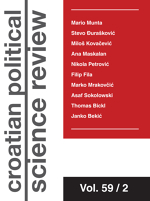Yugoslavs and Europeans Compared: Supranational Polities and Supranational Identification
Yugoslavs and Europeans Compared: Supranational Polities and Supranational Identification
Author(s): Nikola Petrović, Filip Fila, Marko MrakovčićSubject(s): Political history, Social history, Comparative politics, Nationalism Studies, History of Communism, History of European Union, EU-Accession / EU-DEvelopment
Published by: Fakultet političkih znanosti u Zagrebu
Keywords: European Union; Socialist Yugoslavia; Identification; Supranationalism; Member States; Republics;
Summary/Abstract: Drawing on Sekulić, Massey and Hodson’s seminal article ‘Who were the Yugoslavs?’, this paper compares the share and determinants of identifying as Yugoslavs during socialism with the panorama of primary European identification. Eurobarometer surveys containing data on European identification are utilized to that end. The study takes in consideration social and political contexts that shaped supranational identification in particular Yugoslav socialist republics and EU member states. Our findings show low levels of Europeans and Yugoslavs in both polities. The results also show that nationally specific contexts affect both the prevalence of European identification and its determinants. There are considerable differences in the level of European identification among EU countries, and statistical analyses of the Belgian, French and German cases further showed that different factors shape it. Of all the variables, non-exclusive nationalities have been the strongest predictors of supranational identification in both Socialist Yugoslavia and the EU.
Journal: Politička Misao
- Issue Year: LIX/2022
- Issue No: 02
- Page Range: 66-92
- Page Count: 27
- Language: English

